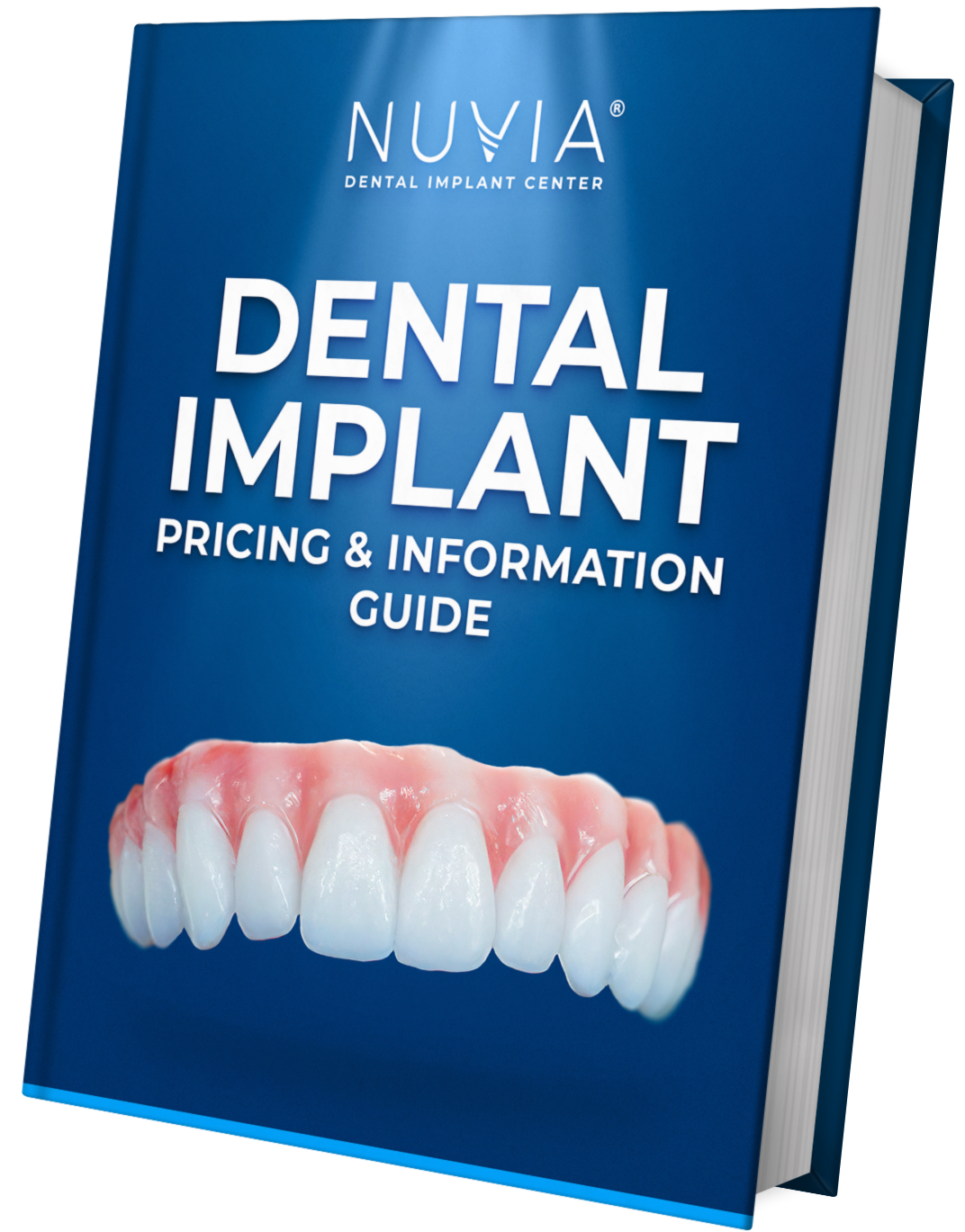
Can Dental Implants Be A Solution For Periodontal Disease?

Periodontal disease is a serious infection of the gum tissue that can lead to bone loss, and if left untreated dental implants may be a great solution. The alarming thing about periodontal disease is that most Americans have no idea if they have this condition or not. Simply put, it can be a silent killer of the mouth. In this article, we'll explore the prevention, symptoms, and treatment of periodontal disease, and if dental implants are the right option for you.
Prevention of Periodontal Disease
The best way to prevent periodontal disease is through good oral hygiene practices. One healthy sign of gum tissue is when the gums appear pink and are tight around the teeth. Here are some tips for maintaining healthy gums and teeth:

- Brush your teeth twice a day for two minutes with a fluoride toothpaste.
- Floss daily to remove plaque and food particles from between your teeth.
- Use a mouthwash to kill bacteria and freshen your breath.
- Avoid smoking and tobacco use, which can increase your risk of gum disease.
- Eat a healthy diet rich in vitamins and minerals that support oral health.
- Visit your dentist regularly to clean your dental implants.
Symptoms of Periodontal Disease
Periodontal disease is caused by the buildup of plaque and bacteria around the teeth, which can eventually lead to damage to the gums and bone below. If you are experiencing any of the following symptoms, you may be in the early stages of periodontal disease and should seek immediate dental care:
- Swollen, red, or dark gums
- Sensitivity in the teeth or gum area
- Receding gums or new gaps in your teeth
- Cysts full of puss
- Loose teeth
- Bleeding when brushing
- Bad breath
Treatment for Periodontal Disease
If caught early, periodontal disease can be treated with a professional cleaning called scaling and root planing and improved oral hygiene. However, if the disease has progressed to the advanced stages, where the teeth may not be able to be saved, dental implants may be the best solution. Here are some common treatment options:

- Professional cleaning: A deep cleaning, called scaling and root planing, that removes build up and bacteria from below the gum line can help prevent further damage.
- Oral antibiotics: Antibiotics may be prescribed to help control the infection and promote healing.
- Gum grafts and surgery: If the disease has caused significant damage, gum grafts, ridge preservation, or other surgeries may be necessary to correct the damage and prevent further bone loss. A periodontist would be able to diagnose and treat advanced cases of periodontitis.
- Dental implants: If the teeth cannot be saved, Nuvia’s dental implants can be a permanent solution to replace missing teeth.
Stages of Periodontal Disease
Gum disease typically progresses in 4 stages, with the earliest stage being gingivitis and then moving on to the 3 stages of periodontal disease.
Gingivitis is a mild form of gum disease that occurs when plaque and bacteria build up on the teeth and irritate the gums. The symptoms of gingivitis include red, swollen, and bleeding gums. While gingivitis is reversible, periodontitis is not.
Once bone loss starts occurring from the gum disease, that is when the gum disease changes from gingivitis to periodontitis. Periodontitis is classified into 3 main stages based on the severity of the disease and the extent of the damage.
The first stage of periodontitis is called early periodontitis, which is characterized by inflammation and some loss of bone support around the teeth. In this stage, the gums may begin to pull away from the teeth, creating pockets where bacteria can accumulate and cause further damage.
The second stage of periodontitis is called moderate periodontitis, which is characterized by significant loss of bone support around the teeth. In this stage, the teeth may become loose and begin to shift out of position.
The third and most severe stage of periodontitis is called advanced periodontitis, which is characterized by extensive loss of bone support around the teeth. In this stage, the teeth may become so loose that they need to be removed.
In addition to causing damage to your teeth and gums, periodontal disease has also been linked to other serious health issues such as kidney, blood, pancreas cancer, diabetes, heart disease, and Alzheimer's. By maintaining good oral hygiene practices and seeking prompt treatment for any signs of gum disease, you can help protect your overall health and well-being.
If you're in need of dental intervention, consider the benefits of dental implants provided by Nuvia. Our experienced dentists are dedicated to providing you with the best possible care for your oral health. Dental implants can restore the function of your mouth and help you regain a sense of normalcy in your life. With our help, countless patients have transitioned from having broken and damaged teeth to enjoying a brand new, beautiful smile. At Nuvia, we understand that going to the dentist can be intimidating, which is why we've implemented state-of-the-art technology to ensure a non-invasive and efficient process. Let us help you achieve the healthy, confident smile you deserve. 1000’s of happy patients have trusted us with our dental implant treatment care and are leading happier and healthier lives.
Sources:
- Sharma P, Dietrich T, Ferro CJ, Cockwell P, Chapple IL. Association between periodontitis and chronic kidney disease: a systematic review of observational studies. J Clin Periodontol. 2016 Mar;43(3):206-15. doi: 10.1111/jcpe.12505. Epub 2016 Feb 15. PMID: 26779517.
- Michaud DS, Izard J, Wilhelm-Benartzi CS, You DH, Grote VA, Tjønneland A, Dahm CC, Overvad K, Jenab M, Fedirko V, Boutron-Ruault MC, Clavel-Chapelon F, Racine A, Kaaks R, Boeing H, Foerster J, Trichopoulou A, Lagiou P, Trichopoulos D, Sacerdote C, Sieri S, Palli D, Tumino R, Panico S, Siersema PD, Peeters PH, Lund E, Barricarte A, Huerta JM, Molina-Montes E, Dorronsoro M, Quirós JR, Duell EJ, Ye W, Sund M, Lindkvist B, Johansen D, Khaw KT, Wareham N, Travis RC, Vineis P, Bueno-de-Mesquita HB, Riboli E. Plasma antibodies to oral bacteria and risk of pancreatic cancer in a large European prospective cohort study. Gut. 2013 Dec;62(12):1764-70. doi: 10.1136/gutjnl-2012-303006. Epub 2013 Feb 22. PMID: 23434752.
- Chistiakov DA, Orekhov AN, Bobryshev YV. Links between atherosclerotic and periodontal disease. Exp Mol Pathol. 2016 Apr;100(2):514-23. doi: 10.1016/j.yexmp.2016.02.012. Epub 2016 Feb 29. PMID: 26940928.
- Kamer AR, Craig RG, Dasanayake AP, Brys M, Glodzik-Sobanska L, de Leon MJ. Inflammation and Alzheimer's disease: possible role of periodontal diseases. Alzheimers Dement. 2008 Jan;4(1):242-50. doi: 10.1016/j.jalz.2007.08.004. PMID: 18631972.
More Articles Like This one

Achieve a Beautiful Smile with All-on-4 Dental Implants

Does Food Get Under Dental Implants?






